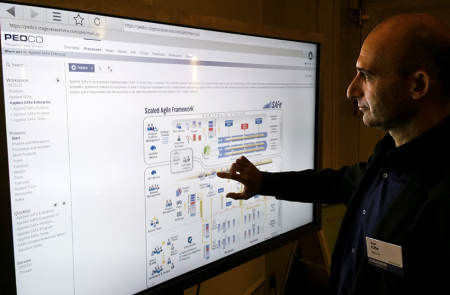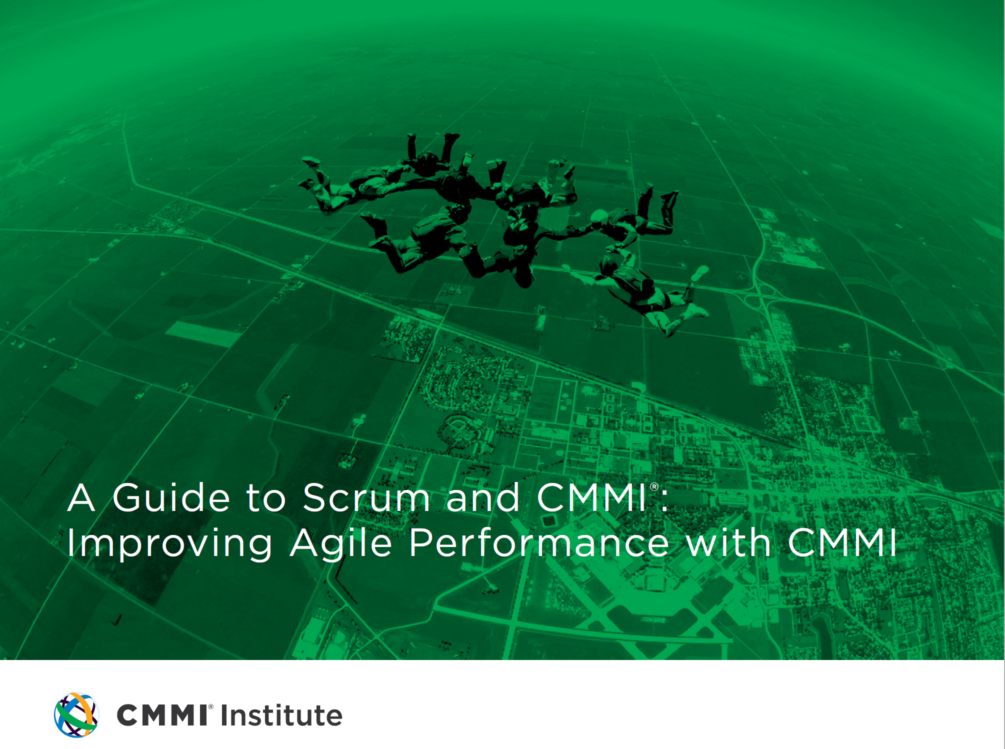
The paper describes typical problems arising in complex systems development and how agile practices (the guide talks about ceremonies/techniques) help to resolve such problems. Each agile practice is then mapped to relevant CMMI Process Areas. This guide is a great help if you want to do agile and, either required by a customer or as a quality standard for your own improvements, want to map SCUM-Practices to the various CMMI-Process Areas. The paper states that the Capability Maturity Model Integration (CMMI)® is being used increasingly around the world to build scalable, resilient, high-performance organizations and empower those organizations to deliver on the promises of agile approaches.
We were happily surprised to find people from the industry (authors of the Guideline) sharing our understanding, that agile and regulated perspectives share the same goals of quality and the satisfaction of customers. As the paper points out, agile and regulated perspectives have differences in emphasis on development productivity and predictability, but this does not make them incompatible.

Although the paper does not talk directly on principles like ‘Customer collaboration over contract negotiation’ , ‘Individuals and interactions over processes and tools’, ‘Working software over comprehensive documentation’ or ‘Responding to change over following a plan’. It is very helpful to get ideas on how to map agile practices in an organization to their own agile processes.
As CMMI talks also about the continuous improvement it asks also for enterprise-level process areas like e.g. ‘Organizational Process Definition’ and ‘Organizational Process Focus’. Such considerations are also reflected in Applied SAFe and we recommend establishing such processes in any organization which just wants to get better in der daily work.
PEDCO recommends this paper if you are interested in using Scaled Agility in a regulated environment including CMMI.
You can read the paper here: http://cmmiinstitute.com/newsroom/cmmi-institute-publishes-guide-scrum-and-cmmi-improving-agile-performance-cmmi
Why read this paper?
(excerpt from Publication on http://cmmiinstitute.com/cmmi-and-agile)
Adoption of CMMI in organizations using agile is steadily increasing. In 2015, over 70% of CMMI appraised organizations reported using one or more agile approaches.
- Organizations leverage the CMMI to scale and strengthen agile
- Organizations use CMMI to address business problems outside the scope of agile.
- Globally, organizations are discovering that CMMI is a necessary companion for successful agile implementations
With widespread, growing adoption in government and commercial sectors, CMMI has become a de facto model for performance improvement for software and systems engineering organizations throughout the world. Agile organizations struggling with performance issues are increasingly turning to CMMI for results.
SCALED AGILITY IN REGULATED ENVIRONMENTS
Peter Pedross – CEO @ PEDCO has been accepted as a speaker at the Capability Counts 2017 Conference organized by the CMMI Institute. The conference will take place in Alexandria (VA), USA on May 16/17th 2017.
Topic of his speech is
‘Scaled Agility in Regulated Environments’
Peter Pedross has also been a speaker at the CMMI 2014 world conference in Arlington, where he spoke about ‘Experience with CMMI in a large-scale environment’. At this past conference it was clearly stated by the vast majority of present lead appraisers that a CMMI Maturity Level 5 can be reached with agile methods. We are really curious to see who the journey has continued world wide. Join this upcoming conference if you are interested to learn from high-class enterprises.
VISIT OUR BOOTH AT THE CONFERENCE!
PEDCO will also have a booth at the CMMI-Capability Conference! Take the opportunity and join us and take a look on our product Applied SAFe, a a fully fledged ALM tool agnostic and officially approved implementation of the Scaled Agile Framework (SAFe®) as a process model.

Applied SAFe works for those organizations who are in highly complex, highly compliant and auditable organizations such as Automotive, Defense, Aerospace, Medical and Finance. These organizations depend on their process and their process authoring and being able to stand up in terms of an audit or against an audit. PEDCO created the product Applied SAFe which creates a dynamic where you can author your entire process and instantiate to your community internal or external and ensure that you have the best and most compliant process for your organization.
Please find here further information on Applied SAFe, its value proposition, brochure and factsheet




